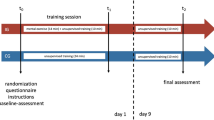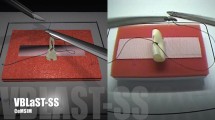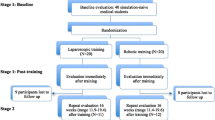Abstract
Introduction
Exercise is beneficial to learning. The purpose of this research was to determine whether an episode of aerobic exercise prior to practice improves the acquisition and retention of laparoscopic skills in the fundamentals of laparoscopic surgery (FLS) simulator.
Methods
Baseline maximal physical fitness (VO2 max), performance on peg transfer (PT), pattern cut (PC), and intracorporeal suture (ICS) were measured for FLS naïve undergraduates. 2 Weeks later, participants were randomized into exercise (E) and control (C) groups. C did unrelated work for 40 min and then practiced PT and PC for 10 min, and ICS for 15 min. Final scores were recorded. In E, participants ran on a treadmill for 20 min at 60 % of their VO2 max. After a 15 min cool down, they engaged in identical FLS simulator training as group C. Both groups completed the NASA task load index (TLX) to assess workload. Retention was recorded 2 months after the training session. Groups were compared using t tests, χ2 and Wilcoxon rank tests. p < 0.05 was considered significant.
Results
There were 52 participants (22 in C; 30 in E) with high physical fitness at baseline. Demographics between the groups were similar at baseline. There were no differences in VO2 max and scores on the three tasks at baseline (all p values NS). There was no statistical significance between the scores of the C and E groups at the training session and retention, except for higher PT scores in the E group after the training session.
Conclusion
In physically fit, surgically naïve students, one bout of aerobic exercise enhanced immediate learning of simple FLS skills but did not have an impact on more complex skills or on retention. The use of exercise in the surgical curriculum, or as a learning tool, warrants further investigation regarding how best to apply it.
Similar content being viewed by others
References
Sroka G, Feldman LS, Vassiliou MC, Kaneva PA, Fayez R, Fried GM (2010) Fundamentals of laparoscopic surgery simulator training to proficiency improves laparoscopic performance in the operating room—a randomized controlled trial. Am J Surg 199:115–120
Ratey JJ (2008) Spark: the revolutionary new science of exercise and the brain. Little, Brown and Company, New York
Wu CT, Pontifex MB, Raine LB, Chaddock L, Voss MW, Kramer AF, Hillman CH (2011) Aerobic fitness and response variability in preadolescent children performing a cognitive control task. Neuropsychology 25:333–341
Tseng CN, Gau BS, Lou MF (2011) The effectiveness of exercise on improving cognitive function in older people: a systematic review. J Nurs Res 19:119–131
Schneiders AG, Sullivan SJ, McCrory PR, Gray A, Maruthayanar S, Singh P, Ranhotigammage P, Van der Salm R (2008) The effect of exercise on motor performance tasks used in the neurological assessment of sports-related concussion. Br J Sports Med 42:1011–1013
Bellini LM, Baime M, Shea JA (2002) Variation of mood and empathy during internship. JAMA 287:3143–3146
Hassmen P, Koivula N, Uutela A (2000) Physical exercise and psychological well-being: a population study in Finland. Prev Med 30:17–25
Physiology CSfE (2002) Physical Activity Readiness Questionnaire. http://www.csep.ca/forms
Bruce RA (1971) Exercise testing of patients with coronary heart disease. Principles and normal standards for evaluation. Ann Clin Res 3:323–332
Doonan RJ, Scheffler P, Yu A, Egiziano G, Mutter A, Bacon S, Carli F, Daskalopoulos ME, Daskalopoulou SS (2011) Altered arterial stiffness and subendocardial viability ratio in young healthy light smokers after acute exercise. PLoS One 6:e26151
Doonan RJ, Mutter A, Egiziano G, Gomez YH, Daskalopoulou SS (2013) Differences in arterial stiffness at rest and after acute exercise between young men and women. Hypertens Res 36:226–231
Fraser SAKD, Feldman LS, Ghitulescu GA, Stanbridge D, Fried GM (2003) Evaluating laparoscopic skills: setting the pass/fail score for the MISTELS system. Surg Endosc 17:964–967
Surgeons SoAGaE (2011) http://www.flsprogram.org/wp-content/uploads/2010/08/Manual-Skills-Guidelines-revised-Feb-2011.pdf
Ritter EMSD (2007) Design of a proficiency-based skills training curriculum for the fundamentals of laparoscopic surgery. Surg Innov 14:107–112
Yurko YY, Scerbo MW, Prabhu AS, Acker CE, Stefanidis D (2010) Higher mental workload is associated with poorer laparoscopic performance as measured by the NASA-TLX tool. Simul Healthc 5:267–271
Hart SG (2006) NASA-task load index (NASA-TLX); 20 years later. Proceedings of the human factors and ergonomics society annual meeting, pp 904–908
Hillman CH, Erickson KI, Kramer AF (2008) Be smart, exercise your heart: exercise effects on brain and cognition. Nat Rev Neurosci 9:58–65
Cotman CW, Berchtold NC (2002) Exercise: a behavioral intervention to enhance brain health and plasticity. Trends Neurosci 25:295–301
Ding YH, Li J, Zhou Y, Rafols JA, Clark JC, Ding Y (2006) Cerebral angiogenesis and expression of angiogenic factors in aging rats after exercise. Curr Neurovasc Res 3:15–23
Tomporowski PD (2003) Effects of acute bouts of exercise on cognition. Acta Psychol 112:297–324
Baghurst T, Kelley BC (2014) An examination of stress in college students over the course of a semester. Health Promot Pract 15:438–447
Stefanidis D, Korndorffer JR Jr, Markley S, Sierra R, Heniford BT, Scott DJ (2007) Closing the gap in operative performance between novices and experts: does harder mean better for laparoscopic simulator training? J Am Coll Surg 205:307–313
Acknowledgments
We would like to acknowledge Drs. Ali Samkari and Yo Kurashima for their help with testing and scheduling. We also would like to thank all the participants.
Disclosures
Genevieve Chartrand, Pepa Kaneva, Andrew F. Mutter, and Drs. Nicole Kolozsvari, Andrea Petrucci and Franco Carli, have no conflicts of interest or financial ties to disclose. Drs. Chao Li and Stella S. Daskalopoulou are supported by Fonds de Recherche Santé Québec. Dr. Liane Feldman is a consultant for Covidien, receives an investigator-initiated research Grant from Ethicon, and has an unrestricted educational grant from Conmed. Dr. Gerald M. Fried has received unrestricted educational Grants from Covidien. Dr. Melina Vassiliou has received an unrestricted Grant to support research form Covidien Canada. The Steinberg Bernstein Centre receives an unrestricted educational Grant from Covidien. This Project was funded by a Grant from the SAGES Education and Research Foundation in 2012.
Author information
Authors and Affiliations
Corresponding author
Rights and permissions
About this article
Cite this article
Chartrand, G., Kaneva, P., Kolozsvari, N. et al. The effects of acute aerobic exercise on the acquisition and retention of laparoscopic skills. Surg Endosc 29, 474–480 (2015). https://doi.org/10.1007/s00464-014-3691-7
Received:
Accepted:
Published:
Issue Date:
DOI: https://doi.org/10.1007/s00464-014-3691-7




